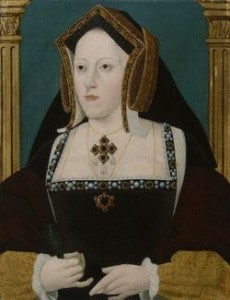 On this day in history, Wednesday 9th April 1533, a “high ranking delegation of Councillors”, headed by the Duke of Norfolk, informed Catherine of Aragon that Henry VIII was married to Anne Boleyn now. Catherine’s Chamberlain, Sir William Blount, 4th Baron Mountjoy, was then left to break the other news to Catherine, that she was no longer Queen and that she was to be known as the Dowager Princess of Wales.
On this day in history, Wednesday 9th April 1533, a “high ranking delegation of Councillors”, headed by the Duke of Norfolk, informed Catherine of Aragon that Henry VIII was married to Anne Boleyn now. Catherine’s Chamberlain, Sir William Blount, 4th Baron Mountjoy, was then left to break the other news to Catherine, that she was no longer Queen and that she was to be known as the Dowager Princess of Wales.
All of this was reported to Emperor Charles V by his ambassador, Eustace Chapuys, in a letter dated the 10th April:-
“But there is no chance that the King will listen that the affair be determined otherwise than by the Archbishop, of whom he is perfectly assured, as he has performed the office of espousal (de l’esposement), as I have formerly written to you ; and he is fully resolved, as he has told many, and those of his Council publish, that immediately after Easter he will solemnize his marriage and the coronation of the Lady. The better to prepare the way, he sent yesterday the dukes of Norfolk and Suffolk, the marquis and the earl of Ausburg (?) to the Queen, to tell her that she must not trouble herself any more, nor attempt to return to him, seeing that he is married, and that henceforth she abstain from the title of Queen, and assume the title of duchess (princess), leaving her the entire enjoyment of the goods she formerly had, and offering her more, if she needed more. The Queen would not fail to advertise me of the interview. I know not whether they are in any doubt as to the Queen’s willingness to dislodge or not ; but about eight days ago, the King’s council commanded my lord Mountjoy to rejoin her with all diligence, and keep watch upon her, and not leave her.”
Catherine of Aragon, a Spanish Princess and Queen of England for nearly 24 years, had been demoted and discarded.